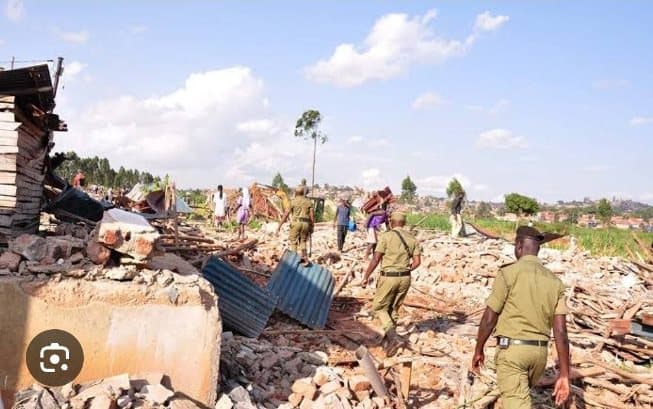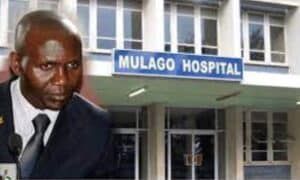The National Environmental Management Authority ( NEMA ) has firmly rejected calls from Parliament to compensate residents who had legally occupied the Lubigi wetland. In a declaration citing current legal provisions, NEMA stated that all residents who established houses in the wetland are considered offenders and therefore not entitled to any compensation.
These statements were made by Sarah Naigaga, NEMA’s Legal Affairs Officer, during her appearance before Parliament’s Committee of Commissions, Statutory Authorities, and State Enterprises (COSASE), which is currently investigating recent evictions in the Lubigi wetland area that spans Kampala and Wakiso districts.
During her appearance before the COSASE committee, Sarah Naigaga, NEMA’s Legal Affairs Officer, explained the legal perspective behind NEMA’s decision. According to Naigaga, the law deems all households issued with restoration orders as offenders.
Restoration is an enforcement action intended to protect the environment for the common good, including those affected by the resolution. As a result, NEMA has not made any compensation to the persons affected.
MP Medard Sseggona raises questions on evictions
Chairing the COSASE committee, MP Medard Sseggona raised several crucial questions to NEMA regarding the evictions in the Lubigi wetland. Sseggona highlighted a letter sent to NEMA’s executive director on June 20, 2024, requesting an update on various issues.
These included the number of evicted persons, the duration of their occupation, the rationale behind the delayed demolition actions, and the perceived selective application of the law.
Allan Mayanja, MP for Nakaseke Central, raised concerns about the consistency of NEMA’s law enforcement and the approval process for infrastructure within the wetland. Mayanja sought clarity on the legal approvals granted for certain infrastructures within the wetland, suggesting a possible inconsistency in law enforcement.
NEMA criticized for delayed action
MP Medard Sseggona criticized NEMA for the delayed action, arguing that it has resulted in significant losses. Sseggona specifically mentioned reduced revenue collection by the Uganda Revenue Authority (URA) due to loopholes in regulation.
He further raised concerns about the constitutional legality of NEMA’s actions, emphasizing the importance of lawful taxation practices.
Parliament, in its pursuit of justice and fairness, demands comprehensive responses from NEMA to address the concerns surrounding the evictions in the Lubigi wetland and ensure the proper and just application of environmental laws. Parliament seeks clarity on the eviction practices and their adherence to legal provisions.
In the midst of the ongoing controversy, a coalition of human rights defenders has called for an investigation into NEMA’s eviction practices in Kampala’s Lubigi wetlands.
The activists denounce what they describe as the criminalization of poverty and systematic human rights violations in NEMA’s eviction operations targeting alleged illegal occupants across Kampala City.
The coalition of human rights defenders criticizes NEMA for its failure to adhere to United Nations guidelines on forced evictions. Activists argue that alternatives should be explored, legal remedies provided, and affected communities should receive adequate compensation.
They highlight the humanitarian impact of NEMA’s actions and question the legality of the evictions.
NEMA’s recent demolitions of homes and displacement of residents have ignited controversy and sparked public outcry. Questions are being raised about the legality and humanitarian impact of these actions. The controversy surrounding NEMA’s activities has also prompted discussions about the limits of NEMA’s authority.
Dr. Barirega Akankwasah, executive director of NEMA, sheds light on the significant reduction of Uganda’s wetland cover. From 15.6% in 1994, it has dwindled to a mere 8.9% in 2019, with a slight recovery to 9.3%.
In an effort to prevent further loss of wetlands, NEMA made the decision to suspend approvals for developments in wetlands as of September 2, 2021, until further notice. However, exceptions are granted for critical public infrastructure,Subtitle 11: Restoration Orders Issued for Lubigi Operation, Claims Dr. Akankwasah
Contrary to some claims, Dr. Barirega Akankwasah asserts that restoration orders were indeed issued for the Lubigi operation. According to Dr. Akankwasah, warnings to vacate the wetland were issued as early as February to April 2016 for Nansana, in 2018 for the Nabweru area, in 2019 for Nabisasiro, in August 2022 for Nansana, Sentema, Busega, and Nabisariso, in December 2023 for Busega, and in April 2024 for Lubigi in general.
Satellite images indicate that the majority of encroachments occurred between 2011 and 2015, and evictions and re-entry have been ongoing since then.
As the investigation into NEMA’s activities in the Lubigi wetland continues to unfold, with questions of legality, fairness, and environmental impact at the forefront. As Parliament seeks to address these concerns and promote responsible stewardship of Uganda’s natural resources, the public eagerly awaits further developments in this ongoing saga.












